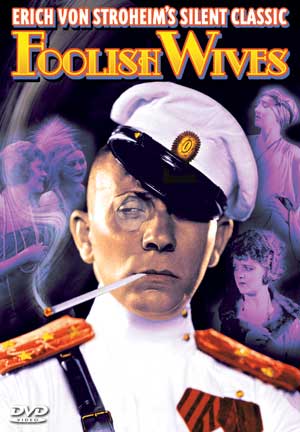17. Foolish Wives (1922)

Directed by Erich Von Stroheim
Synospis
An American diplomat is stationed to Monte Carlo with his wife only to have her fall in the grasp of machiavelic Count Karamzin (Stroheim) who with the help of his two female "cousins" tries to get money off of the couple. The film culminates in a spectacular fire scene where Karamzin and the American wife have been locked in a tower by the jealous maid of Karamzin. Karazim gets killed in the end when after his plot is discovered he attempts to rape the mentally challenged daugther of a forger with whom he had had some deals.
Review
I have been reviewing a good roll of films, and this is no exception. Foolish Wives is probably the most modern feeling of the films reviewed until now. So much so that you soon forget that you are watching a silent film, the use of intertitles is sparse, and all the melodramatic overacting usually associated with silent films is fortunately absent from this film.
For Stroheim less is definitely more in terms of acting, but the same cannot be said in terms of sets. Stroheim rebuilt Monte Carlo on a Universal lot, and it is truly amazing. Yet, even though we have seen such scales of scenery before, as in Griffith's Intolerance for example, we haven't seen the quality of acting that this film shows before. Dr. Mabuse comes close, and also feels very modern, but the subtelty of Stroheim's film is truly amazing, characters react like people would, and a subtle movement is enought to express a whole gamut of feelings. A very welcome change from Griffith's hystrionics.
Also, the plot is fascinating, the way in which the suave European in the character of Karamzin contrasts with the Americans is fantastic. Even though he is the villain, he is colourful, exciting and dramatic while the Americans are dull and uninspiring, even if honest and well meaning. Stroheim was also a master of the visual metaphor, the burning cross at the end, or the dingy place where he spends the night with the American woman are good examples of this, as are the lavish settings where Karamzin finds himself in compared to the duller settings of the American diplomat.
A truly great director, and I am now looking forward to watching Greed sometime in the future. Buy it from Amazon UK
Final Grade
9/10
Trivia
Stroheim is a character in one of the Young Indiana Jones episodes. Don't remember which one just now.
From Wiki:
A myth-maker extraordinaire, mystery surrounds his origins. His most recent biographers have written that Stroheim was born in Vienna, Austria in 1885 as Erich Oswald Stroheim, the son of Benno Stroheim, a middle-class hat-maker, and Johanna Bondy, both of whom were practising Jews.
Von Stroheim himself claimed to be Count Erich Oswald Hans Carl Maria von Stroheim, the son of Austrian nobility like the characters he played in his films. However Jean Renoir writes in his memoirs: “Stroheim spoke hardly any German. He had to study his lines like a schoolboy learning a foreign language.”
Later in life, while living in Europe, in published remarks Stroheim claimed to have "forgotten" his native tongue. Whatever the truth, by 1914 he was working in Hollywood.
He began working in movies in bit parts and as a consultant on German culture and fashion. His first film was The Country Boy, in which he was uncredited, in 1915. His first credited role was Old Heidelberg.
He began working with D. W. Griffith, with uncredited roles in Birth of a Nation and Intolerance. But he began playing the sneering German in such films as Sylvia of the Secret Service and The Hun Within. In The Heart of Humanity, he threw a baby out a window.
Following the war, he turned to writing and directing, first directing his own script for Blind Husbands in 1919. As a director, Von Stroheim was known to be dictatorial and demanding, often antagonizing his actors; he was one of the first filmmakers to fulfill the stereotype of the Teutonic tyrant, often wearing a monocle and carrying a riding crop while directing.

0 Comments:
Post a Comment
<< Home